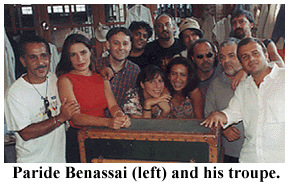...Best of Sicily
presents... Best of Sicily Magazine. ... Dedicated to Sicilian art, culture, history, people, places and all things Sicilian. |
by Gilda Sciortino | ||
Magazine Best of Sicily Arts & Culture Fashion Food & Wine History & Culture About Us Travel Faqs Contact Map of Sicily |
"In this field the stage is the only real school," observes Benassai. "I feel fortunate because I've always done what I wanted to do, pursuing a profession which, despite thousands of difficulties, has always given me very much." And his experiences have been many. Certainly, he himself says, things were different working during the 1970s. In those days, one experimented, the private theatres and playhouses were started, and acting was pursued without problems. "The problem today," the Palermo artist continues, "is that there are always fewer and fewer places to perform. In this city, the same people have always worked, and it's truly amazing if we consider the fact that locally there are two permanent theatres, a Drama Festival (the Festival del Novecento) and numerous other cultural institutions. We have to distance ourselves from this affinity we've developed for foreign imports which leads us to invite this or that international artist at the cost of enormous financial resources. Why not, instead --and I'm not saying exclusively, but principally-- concentrate on our own local artists?" Forty-four years old, with two daughters, and a love for life and for everything that flows from it, Paride Benassai is a gold mine of emotions and stories of life experiences. It's a life that has taken him far from his home city to confront new experiences that, finally, made him decide to return to his own land, secure in the knowledge that it was the only place he could bring out the best of himself. Over the years, he has developed many projects working with great theatrical masters like Guicciardini, Quartucci and Licata, and with actors like Brogi, De Carmine, Gazzolo, and Occhini. It is such experiences "Nofrio, Virticchio and the Plague at Palermo" is the play that will be performed starting in January at the Zisa Cultural Center, being presented again at Sommatino in June. "I'm also working on two other projects for the cinema," he concludes, "but it's still too early to discuss them. One thing I'm happy about is that right now, in film as well as national theatre, there is a strong presence of actors from Palermo. A concrete example is "The Hundred Steps" by Marco Tullio Giordana, which has re-introduced to the public the professional calibre of Gigi Burruano and Tony Sperandeo. My point is that, in our business, it's always important to jump in and to experiment with new ideas. I hope that I never lose my enthusiasm, and that I always want to continue grow. But more than anything, to maintain this deep love for life that allows me to remain a child capable of being fascinated at anything." About the Author: Based in Palermo, Gilda Sciortino is a journalist who has written for Il Mediterraneo, the Giornale di Sicilia and other publications, covering a wide range of subjects. | |
Top of Page |
 Since his earliest years, his life has been dedicated to the theatre. It has been the vital channel through which he has always drawn the vibrant energy to communicate his feelings and emotions. For Paride Benassai, one of the most representative exponents of popular theatre in Sicily, the dramatic flame was lit at the age of six, playing the Dauphin of France in Marie Antoinette at the
Since his earliest years, his life has been dedicated to the theatre. It has been the vital channel through which he has always drawn the vibrant energy to communicate his feelings and emotions. For Paride Benassai, one of the most representative exponents of popular theatre in Sicily, the dramatic flame was lit at the age of six, playing the Dauphin of France in Marie Antoinette at the  over the years that have formed him, taking him to the present --strong and secure in himself, but above all providing him with a cultural and professional resumé without equal. Makallè, Kuè and Santa Lucia Pier are some of his recent productions, and all have dominated the Summer theatre season in Palermo. But we shouldn't overlook a very recent experience which allowed him to challenge himself in the world of cinema as assistant director in the film "Brancaccio" for Italian television. Scheduled to air in the Spring, it deals with the story of Father Pino Puglisi, the Palermo priest murdered by the Mafia. In the same film, Benassai portrays Rosario La Mattina, the priest's friend, an ice cream maker by profession, who is killed by kidnappers.
over the years that have formed him, taking him to the present --strong and secure in himself, but above all providing him with a cultural and professional resumé without equal. Makallè, Kuè and Santa Lucia Pier are some of his recent productions, and all have dominated the Summer theatre season in Palermo. But we shouldn't overlook a very recent experience which allowed him to challenge himself in the world of cinema as assistant director in the film "Brancaccio" for Italian television. Scheduled to air in the Spring, it deals with the story of Father Pino Puglisi, the Palermo priest murdered by the Mafia. In the same film, Benassai portrays Rosario La Mattina, the priest's friend, an ice cream maker by profession, who is killed by kidnappers.